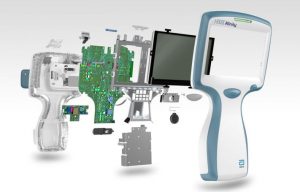Medical device and healthcare company Abbott recently announced that it has gained a 510(k) clearance from the Food and Drug Administration (FDA) for its traumatic brain injury diagnostics device. Abbott looks to reduce wait time and expand its experience in the field of diagnostics through a protein measuring blood test.
The new device works to diagnose a TBI, which according to Abbott, is an alteration in brain function caused by an external force, such as a concussion. First a small blood sample is taken from the arm. Next plasma is extracted with a centrifuge and placed on a cartridge. The test runs on Abbott’s I STAT Alinity platform and delivers results within 15 minutes.
The company looks to reduce unnecessary CT scans by 40% by measuring biomarkers UCH-LI and GFAP, which are proteins found in the bloodstream after a TBI. Abbott is also working on a whole blood test, removing the step of plasma extraction. The company also gained an FDA breakthrough designation for a TBI test that would run on its Alinity I and ARCHITECT core laboratory instruments.
Abbott’s goal is to provide a diagnostic medical device for patients in need of rapid results. The company has already shifted its focus to speedy results during the COVID-19 pandemic, meeting testing needs for healthcare facilities and at home diagnostics.
In March, Abbott launched its ID NOW COVID-19 molecular test, delivering results in 13 minutes, and its m2000 RealTime System used in healthcare facilities. The company said it sold almost $900 million dollars in COVID-19 kits and expects its fourth-quarter sales run rate to be up to $1.4 billion.
Abbott's COVID-19 diagnostic kits have been molecular, testing for the virus’s genetic material in an individual's genome and proteome. The company also looks to develop antigen and antibody tests, getting quick results by testing for proteins that belong to the virus.
The need for testing devices for COVID-19 has boosted Abbott's participation in the diagnostic industry and has helped it double the footprint of portable diagnostic machines in the U.S. Abbott continues to provide rapid results and is working to increase accuracy for the growing implementation of fast diagnostics.























